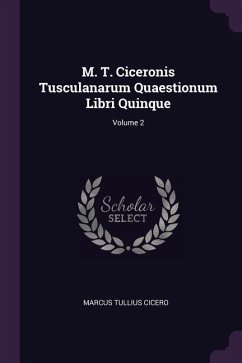Tusculanarum Disputationum Ad M. Brutum Libri Quinque (1884) is a book written by the famous Roman philosopher and orator, Marcus Tullius Cicero. The book is a collection of five dialogues between Cicero and his friend, Marcus Brutus, in which they discuss various philosophical topics such as death, grief, virtue, and the nature of the gods. The title of the book, Tusculanarum Disputationum, refers to the location of the dialogues, which took place at Cicero's villa in Tusculum. The book is written in Latin and was originally published in 45 BC. In the first dialogue, Cicero discusses the nature of grief and how to overcome it. He argues that grief is a natural emotion, but that it can be overcome through reason and philosophy. In the second dialogue, Cicero explores the topic of death and argues that it is not something to be feared, but rather something to be accepted as a natural part of life. In the third dialogue, Cicero discusses the nature of pain and how to deal with it. He argues that pain is a necessary part of life and that it can be overcome through the practice of virtue. In the fourth dialogue, Cicero explores the nature of pleasure and argues that it should be pursued in moderation and with an eye towards the greater good. Finally, in the fifth dialogue, Cicero discusses the nature of the gods and argues that they exist and that they are benevolent. He also explores the topic of divination and argues that it is possible to predict the future through reason and observation. Overall, Tusculanarum Disputationum Ad M. Brutum Libri Quinque is a fascinating exploration of some of the most important philosophical topics of the ancient world. It is a must-read for anyone interested in the history of philosophy or the works of Cicero.This scarce antiquarian book is a facsimile reprint of the old original and may contain some imperfections such as library marks and notations. Because we believe this work is culturally important, we have made it available as part of our commitment for protecting, preserving, and promoting the world's literature in affordable, high quality, modern editions, that are true to their original work.
Hinweis: Dieser Artikel kann nur an eine deutsche Lieferadresse ausgeliefert werden.
Hinweis: Dieser Artikel kann nur an eine deutsche Lieferadresse ausgeliefert werden.








